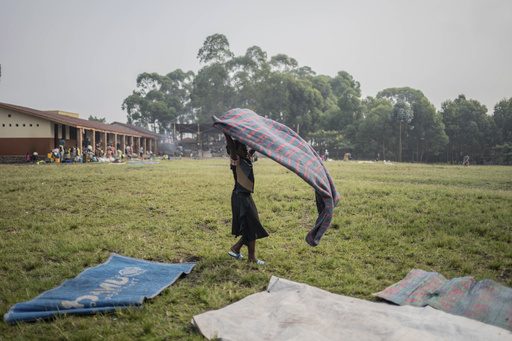
GOMA, Congo — Life has been a continuous cycle of fear and displacement for Zawadi Sifa and her seven children, who have known nothing but instability during their lives. Sifa’s experiences reflect that of countless families affected by the recent surge of violence in eastern Congo, particularly after the Rwanda-backed M23 rebels captured the strategic city of Goma last month, extending their territory in this resource-rich region.
Sifa recounted her plight, saying, “Every time I give birth… we are fleeing,” while cradling her youngest baby. The M23 rebels are among over 100 armed groups fighting for control in the area and have significantly intensified their military efforts against government forces, resulting in escalating tensions near Goma, the capital of North Kivu.
Initially, Sifa’s family was able to seek refuge in a camp in Sake, but as the situation worsened and the rebels took over that location as well, they relocated to a camp on the outskirts of Goma. However, the advancing M23 forces soon prompted them to find shelter in a parish further into the city, joining hundreds of other displaced individuals.
Recently, M23 declared its control over Goma and began efforts to establish order in the city. Basic utilities such as water and electricity were gradually restored, and shops and schools began to reopen. Meanwhile, aid workers hurriedly collected bodies from the streets under the watch of rebel patrols. The latest round of violence has claimed approximately 3,000 lives and has left nearly as many injured since January.
Despite some semblance of restored services, Sifa and many others in the same predicament lament that their struggles are far from over. The ongoing conflict in Congo, characterized by decades of fighting, has forced 4.6 million people into displacement. The UN has classified it as one of the most enduring and complicated humanitarian crises on the planet.
Before the recent fighting escalated, Goma was already serving as a critical humanitarian center, housing 700,000 displaced individuals. The camps in the vicinity of the city, which had accommodated over 300,000 people, recently experienced heavy artillery fire due to clashes between the rebels and government forces. As reported by UNHCR spokesperson Matt Saltmarsh, this heavy bombardment has led many to flee once again, seeking shelter in churches, schools, offices, or with relatives.
“Millions of individuals were already displaced due to years of conflict, and the humanitarian demands were enormous,” stated the International Organization for Migration. “With the alarming rise in violence, the already desperate situation is deteriorating swiftly.”
Sifa first fled her hometown of Kasharo in 2012, managed to return for a while, but ultimately had to escape again two years ago to Sake following increased unrest. When the M23 took control of Sake last month, she and her family sought refuge in another camp in Rusayo, just outside Goma. With conflicts closing in once more, they eventually sought asylum at a local parish.
At first, they were allowed to stay in the parish school, but later were told to move outside. Following the rebels’ declaration of authority, the parish priest asked the displaced individuals to return to their original homes. The priest chose not to comment when approached for a response.
Aid workers expressed concern that some displaced individuals are returning to areas where safety cannot be guaranteed. “Many of these regions still experience violence or lack fundamental services like housing and clean water,” remarked Rose Tchwenko, the country director for Mercy Corps.
In a recent event, the rebels organized a gathering at Goma’s stadium, vowing to provide safety under their administration in an attempt to gain public support amidst mounting international scrutiny. During the assembly, rebel leader Corneille Nangaa proclaimed the city to be “liberated and safe” and called for normalcy to return.
However, U.N. human rights experts have refuted these assertions, describing the current environment as perilous, especially for women and girls, amid allegations of sexual violence, targeted killings, enforced recruitment, and arbitrary detentions. U.N. Secretary-General António Guterres has urgently called for the rebels and their Rwandan supporters to halt hostilities, emphasizing that there is no military solution to the ongoing crisis.
“Now is the time for mediation, for resolution, and for a return to peace,” stated Guterres, who is set to attend a conference in Ethiopia next week where this crisis will be a primary issue of discussion.
For Sifa, returning to her village seems impossible. “I heard that those who have tried to go back were attacked or killed,” she explained. “We will remain in Goma for a little longer, even if it means living on the street.” Her days consist of searching for food and water by begging or using her last few savings, all while caring for her children, two of whom are unwell. She tidies up the small area they occupy, which consists of a few worn pots and clothes.
“Since 2012, we have been running from war… I have no other place to go,” she lamented while preparing ugali, a dish made from corn flour that she managed to procure earlier. “We are lost and don’t know what to do.”

